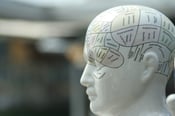 Over the past few years I’ve been doing a lot of reading, and a fair amount of writing on this blog, around what truly drives academic performance. One of my favorite (and most important) insights has been that IQ, or natural intelligence, is far less important than people assume it to be. This article considers that insight from a different angle, and introduces an interesting new book about how it may be possible to improve your IQ through targeted training.
Over the past few years I’ve been doing a lot of reading, and a fair amount of writing on this blog, around what truly drives academic performance. One of my favorite (and most important) insights has been that IQ, or natural intelligence, is far less important than people assume it to be. This article considers that insight from a different angle, and introduces an interesting new book about how it may be possible to improve your IQ through targeted training.
Improving Academic PerfORMANCE
Learn how to improve yourself through targeted learning and improved study skills.
Posts about IQ:
Improved Academic Performance through Better Nutrition
 Numerous new studies show a promising link between good nutrition and optimal academic performance.
Numerous new studies show a promising link between good nutrition and optimal academic performance.
So, let’s explore whether you should start drinking green smoothies and munching on kale chips to increase your likelihood of getting that ACT score or grade you want (to use a few examples of strategies we've encountered...).
Effort vs. Talent? Which has a greater impact on academic success? Part One
 Anybody that reads this blog knows that we like to write about how mindset, effort, deliberate practice, proper study habits, organization and time management skills, strategic planning (and many other concepts that have more to do with “what you do” than “what you are born with”) are critical drivers of academic success. And, importantly, they are firmly under the control of any student. In our view, these concepts as a group easily trump IQ or talent when it comes to explaining success in and outside of school.
Anybody that reads this blog knows that we like to write about how mindset, effort, deliberate practice, proper study habits, organization and time management skills, strategic planning (and many other concepts that have more to do with “what you do” than “what you are born with”) are critical drivers of academic success. And, importantly, they are firmly under the control of any student. In our view, these concepts as a group easily trump IQ or talent when it comes to explaining success in and outside of school.
At the same time, we know that genes do matter. IQ is a metric that does help explain academic and other types of performance, and it is, for example, correlated with performance on standardized tests (even though I must stress again, hard work and structured practice will help you improve dramatically on standardized tests whatever your starting point).
So, is there a framework that can be used to think about the relationship between effort and talent in explaining academic and other types success? Which is more important?
It's a tough question, but while listening to a recent episode of the Psychology Podcast hosted by Dr. Scott Barry Kaufman, I think I may have found an answer.
The Dynamic Brain: A Fresh Outlook on Learning Potential
 The old adage “you can’t teach an old dog new tricks” has some interesting implications when applied to humans through the lens of something called neuroplasticity, which is essentially how malleable, dynamic and flexible the neurons (brain cells) in our brain are. This is directly related to the phenomenon of learning. Although, one must wonder when it comes to canines if sometimes the older dog truly can’t learn new tricks, or is simply just too old to care or try!
The old adage “you can’t teach an old dog new tricks” has some interesting implications when applied to humans through the lens of something called neuroplasticity, which is essentially how malleable, dynamic and flexible the neurons (brain cells) in our brain are. This is directly related to the phenomenon of learning. Although, one must wonder when it comes to canines if sometimes the older dog truly can’t learn new tricks, or is simply just too old to care or try!
For me, this raises a few questions:
- What is it about getting older that makes it harder for us to learn new things?
- Or is this just a thought put into our heads and are we perhaps not giving our magnificent brains enough credit?
- And what does this say about the period of time while we are young and supposedly able to “learn new tricks”?
- Why is it easier to learn when we are younger?
Keys to Success: Beyond Hard Work and Intelligence
 If you ask a random collection of people what is needed to be successful in school, you’ll probably receive quite a few responses along the lines of “hard work” or “a high IQ.”
If you ask a random collection of people what is needed to be successful in school, you’ll probably receive quite a few responses along the lines of “hard work” or “a high IQ.”
I would never suggest that one shouldn’t work hard, or shouldn’t always try to continually build their intelligence. But I think there’s mounting research and evidence that hard work and intelligence really aren’t the fundamental drivers of academic, professional, interpersonal/social, athletic, or artistic success.
Before introducing four more fundamental keys to success, let’s briefly discuss why hard work and intelligence don’t really lead to success, and might even lead to failure.
